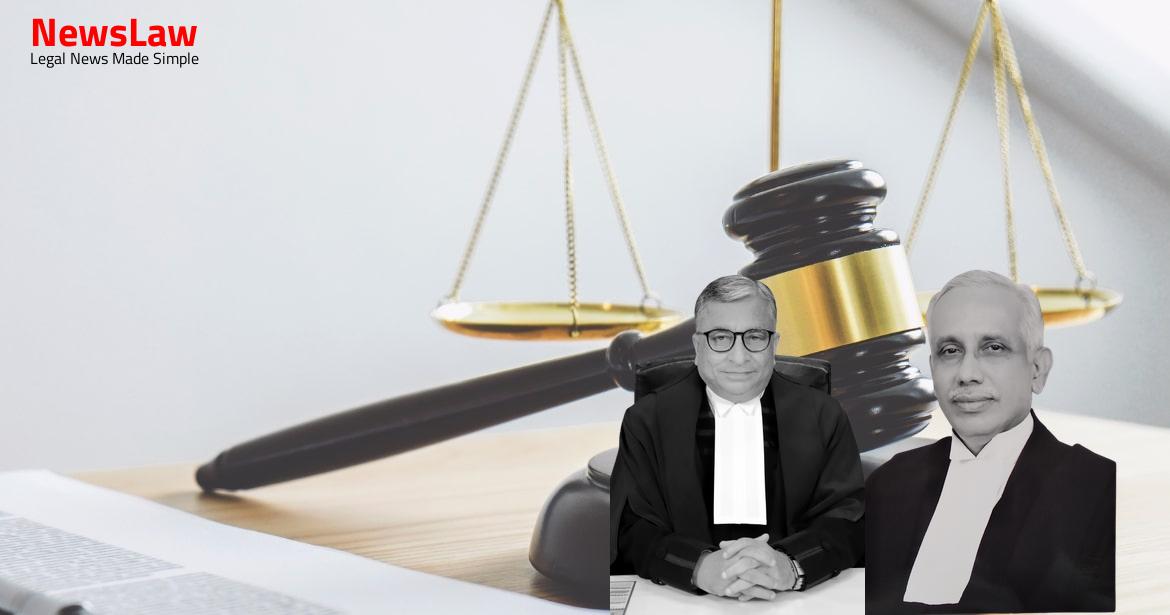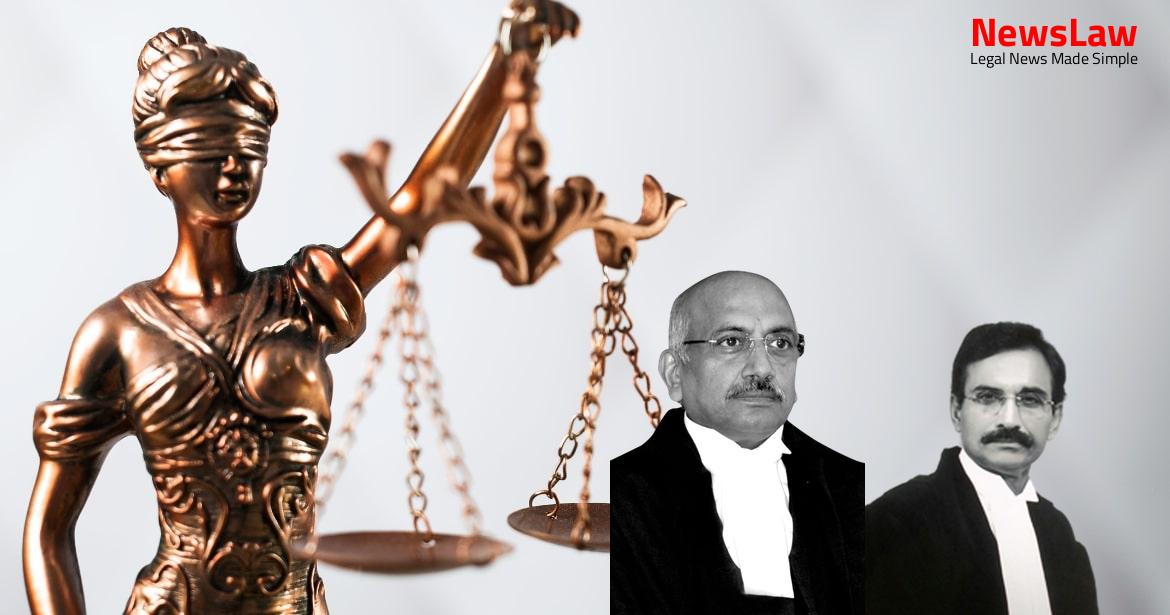Explore a case where a High Court’s adherence to Transfer Policy guidelines came under legal scrutiny. The court’s in-depth legal analysis focused on issues of arbitrariness, fairness, and the doctrine of legitimate expectations. Discover the complexities of balancing legitimate expectations with the need to uphold the rule of law in judicial decision-making processes.
Facts
- The petitioner approached the Court seeking to quash and set aside the transfer order citing it as illegal and mala fide.
- The petitioner resigned on 15 July 2014, which was accepted by the Government of Madhya Pradesh.
- The Judicial Inquiry Committee recommended the petitioner’s reinstatement if she wished to re-join the service.
- The Transfer Committee of the MP High Court approved the petitioner’s transfer from Gwalior to Sidhi on 7 July 2014.
- The petitioner sent representations seeking alternative postings due to family circumstances, which were rejected.
- The petitioner had requested re-instatement as per Transfer Policy, which was not adhered to by the MP High Court.
- The petitioner’s resignation was deemed as constructive dismissal due to the employer’s conduct.
- The petitioner’s pleadings were limited to the illegality and mala fides in the transfer order.
- The petitioner made representations for re-instatement and transfer to enable her daughter’s education.
- Representations were rejected by the Full Court of MP High Court in meetings held on 11 January 2018 and 15 February 2019.
- Assessments of the petitioner in 2012 and 2013 were ‘good’ and ‘very good’ respectively.
- Petitioner filed a petition seeking reinstatement during the pendency of which, a request was made for reconsideration of the issue by the MP High Court.
- Judicial Inquiry Committee found irregularities in the petitioner’s transfer to Sidhi.
- The matter was directed to another Bench for consideration.
- Events related to the Inquiry of Justice ‘A’ also transpired during this period.
Also Read: Presumption of Genuine Endorsements in Cheque Case
Arguments
- The Transfer Policy allows a Judicial Officer to stay beyond the prescribed period if their daughter is in the final year of exams and the educational institution lacks hostel facilities for girls.
- The JIC found the petitioner’s transfer to be contrary to the Transfer Policy.
- The petitioner is willing to forego back wages and seeks re-instatement to serve the judiciary.
- Allegations of sexual harassment made by the petitioner were found to be not established by the JIC.
- The legality and timeliness of challenging the transfer order were questioned by the respondents.
- The Full Court of the MP High Court did not adequately address the petitioner’s grievances.
- The petitioner’s requests for transfer to locations accommodating her daughter’s education were rejected without due consideration.
- The respondent allegedly did not consider if the petitioner’s case fell under the Transfer Policy’s Clause 9(a).
- The transfer from a Category ‘A’ city to a ‘C’ city was deemed irregular.
- The Transfer Committee recommended transfer primarily based on a complaint by the D & SJ of Gwalior.
- The petitioner’s resignation was deemed ‘forced’ due to the circumstances.
- The petitioner asserted that she was willing to abide by the transfer order after her daughter completed Class 12.
- The alleged ‘coercion resulting in resignation’ concept was debated on its applicability to a Judicial Officer.
- The petitioner’s representations and pleas were reportedly not earnestly considered by the Transfer Committee.
- The concept of coercion leading to resignation was compared in the context of western labor jurisprudence.
- The petitioner highlighted the importance of her daughter’s education as a significant factor in her transfer-related decisions.
- Shri Mehta submitted that the Full Court of the MP High Court has unanimously rejected the petitioner’s representation regarding re-instatement in service on multiple occasions.
- If the view that mid-term transfer coupled with inconvenient family circumstances amounts to ‘coercion’ to resign is accepted by the Court, it may lead to an increase in litigations.
- Shri Mehta emphasized that any decision in the current case will have significant implications for the future.
- He argued that Judicial Officers, although expected to be impartial and fearless, are also human beings and parents, and their personal decisions should be evaluated considering this aspect.
- The resignations should be assessed taking into account all surrounding circumstances, not in isolation.
- Shri Mehta contended that all similarly situated Judicial Officers could use the same argument if the petitioner’s plea is entertained.
- He highlighted that interference with a unanimous decision of the Full Court of a High Court should only be done in rare cases, citing relevant judgments to support this position.
Also Read: Medical Negligence and Compensation: A Landmark Decision
Analysis
- The resignation dated 15 July 2014 of the petitioner could not be considered voluntary due to the circumstances surrounding it.
- The rejection of the petitioner’s representations by the MP High Court was found to be arbitrary and not in accordance with the Transfer Policy.
- The transfer of the petitioner from Gwalior to Sidhi was deemed to be against the Transfer Policy guidelines and lacked proper consideration.
- The speed at which events transpired raised suspicions of underlying reasons beyond what was apparent.
- The JIC findings pointed towards coercion leading to the petitioner’s resignation.
- The legitimate expectations of the petitioner based on the Transfer Policy were not met by the MP High Court’s actions.
- The rejection of representations, speedy transfer decision, and lack of consideration led to the untenable situation for the petitioner, resulting in resignation.
- The resignation was seen as a culmination of frustration and injustice felt by the petitioner without proper redressal.
- The Full Court decisions were not being directly challenged, focusing only on specific issues related to the petitioner’s resignation and transfers.
- The Transfer Policy guidelines were not adhered to, leading to conclusions of arbitrariness and lack of fairness in the petitioner’s case.
- Clause 9 of the Transfer Policy outlines grounds for extension of stay for Judicial Officers.
- Sub-clause (a) specifies criteria for extension related to a daughter’s education in Category ‘A’ places.
- Criteria for Category ‘B’, ‘C’, and ‘D’ places allow extension regardless of ward’s gender and hostel availability.
- Verification and approval by District Judge and Portfolio Judge are required for the extension based on daughter’s education.
- Extension on grounds of illness is covered in sub-clause (b).
- Chief Justice or Committee of Judges decide on extensions within three weeks of receiving representations.
- Chief Justice has overriding powers for transfer orders per Clause 26.
- Policy allows Chief Justice to delegate powers for Policy implementation.
- No extension on deputation after three years, except in exceptional circumstances.
- Transfer takes place from Category ‘A’ to ‘D’ based on the hierarchy outlined.
- Registrar General prepares a list of Officers completing their tenure.
- Husband and wife Judicial Officers may be posted together or at nearby locations as per Clause 18.
- Preference in posting is given based on close relative’s serious ailment (Clause 19) and physical disability over 40% (Clause 20).
- Officers with two years in outlying Courts have preference for transfer to District Headquarters (Clause 21).
- Transfer before completion of tenure may occur due to performance issues or public interest (Clause 22).
- Officers nearing retirement may choose posting at their preferred settlement location (Clause 23).
- Chief Justice retains the power to issue directions not explicitly covered by the Policy under Clause 24.
- The concept of legitimate expectation plays a crucial role in judicial review to ensure fair decision-making.
- The burden of proof lies on the individual alleging a violation of Article 14 of the Constitution of India.
- Judicial review is limited to grounds of illegality, irrationality, and procedural impropriety.
- Resignation involves the voluntary surrender of a position without coercion or duress.
- A resignation must be unconditional and with the clear intention to relinquish the office.
- The act of relinquishment may take different forms depending on the nature of the office.
- A resignation may be prospective to take effect from a future date specified.
- The doctrine of legitimate expectation requires due consideration in decision-making processes.
- Every judgment is applicable to specific facts and is not a general exposition of the law.
- An order of transfer should not be interfered with unless proven to be mala fide.
- Malice in law refers to acts done without lawful excuse and disregarding the rights of others.
- The scope of judicial review is limited to prevent arbitrariness in state actions.
- Law is supreme and no one is above the law.
- The decision was made based on the peculiar facts and circumstances of the present matter.
- Hopes for similar situations to be avoided in the future, especially between a High Court and a Judicial Officer.
Also Read: Remand of Writ Petition for Restoration and Decision on Merits
Decision
- Petitioner’s resignation from the post of Additional District & Sessions Judge, Gwalior dated 15 July 2014, cannot be construed as voluntary.
- Order accepting the resignation by respondent No. 2 on 17 July 2014 is quashed and set aside.
- Respondents directed to reinstate the petitioner as an Additional District & Sessions Judge with immediate effect.
- Petitioner entitled to continuity in service with all consequential benefits.
- No back wages granted to the petitioner.
- Pending application(s) to be disposed of accordingly.
Case Title: X Vs. REGISTRAR GENERAL (2022 INSC 171)
Case Number: W.P.(C) No.-001137 / 2018



